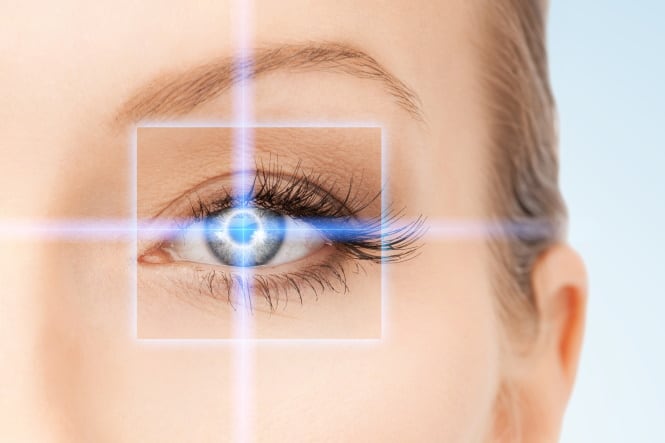Our Kansas City Eye Surgeons Will Officially Determine Your Candidacy Through an Advanced Ocular Analysis
Of people in the United States with vision impairments, 80 percent are caused by a refractive error. And if you have difficulty seeing without glasses or contacts, you’re likely one of that 80 percent.
A refractive error is a common eye disorder, which occurs when your eye can’t focus clearly. Some refractive errors affect your close-up vision, some affect your far-away vision, and some make everything look a little blurry.
There are four main refractive errors: nearsightedness, farsightedness, astigmatism, and presbyopia. If you have one or multiple of these refractive errors, you could reduce or eliminate your reliance on your glasses or contact lenses with laser vision correction in Overland Park, Kansas.
Together, we’ll explore the four most common refractive errors and learn more about the procedures that may resolve them.
Laser Vision Correction for Astigmatism
An astigmatism is an uneven curvature of the cornea. Your cornea should be a rounded dome shape, but when you have astigmatism, it’s shaped more like an egg. An unevenly shaped cornea bends the light your eyes take in, allowing it to hit multiple points on the retina at the back of your eye. The result is blurry vision, both near and far away.
People with astigmatism may be candidates for:
- SBK Advanced LASIK Surgery
- Refractive Lens Exchange
- Advanced Surface Ablation PRK
- Refractive Cataract Surgery (if cataracts are also present)
- SMILE Vision Correction
Laser Vision Correction for Farsightedness
Also called hyperopia, farsightedness means you can clearly see objects that are at a distance, but nearby ones may be blurry. People are farsighted to different degrees.
People with farsightedness may be candidates for:
- SBK Advanced LASIK Surgery
- Refractive Lens Exchange
- Advanced Surface Ablation PRK
- Refractive Cataract Surgery (if cataracts are also present)
Laser Vision Correction for Nearsightedness
Also called myopia, nearsightedness is the opposite of farsightedness. If you’re nearsighted, you can only clearly see objects that are close by, while those at a distance are blurry. There are degrees of severity of nearsightedness.
People who are nearsighted may be candidates for:
- SBK Advanced LASIK Surgery
- Refractive Lens Exchange
- Refractive Cataract Surgery (if cataracts are also present)
- Advanced Surface Ablation PRK
- SMILE Vision Correction (for mild to moderate nearsightedness)
- Phakic IOLS (for extreme nearsightedness)
Laser Vision Correction for Presbyopia
Don’t confuse presbyopia for hyperopia! Presbyopia describes the gradual loss of your eye’s ability to focus on close-by objects, and occurs as you age. Many people start noticing that they may need reading glasses in their early- to mid-40s, and it gets worse until you reach your mid-60s.
People who have presbyopia may be candidates for:
- Refractive Lens Exchange
- Refractive Cataract Surgery (if cataracts are also present)
Let Us Make It Clear For You
With so much overlap between refractive errors and the laser vision correction procedures that help them, it can be confusing to keep it straight as you find out whether you’re a candidate.
To make it more clear for you, we’ve created this handy chart, so you can cross-reference your refractive error or errors and see which eye surgery you may want to ask your ophthalmologist or refractive eye surgeon about.
| Refractive Error | ||||
|---|---|---|---|---|
| Laser Vision Correction Procedures | Nearsighted | Farsighted | Astigmatism | Presbyopia |
| SBK Advanced LASIK | X | X | X | |
| Advanced Surface Ablation PRK | X | X | X | |
| SMILE Vision Correction | X | X | ||
| Phakic IOLs | X | |||
| Refractive Lens Exchange | X | X | X | X |
| Refractive Cataract Surgery (if cataracts are present) | X | X | X | X |
How Do I Know I’m a Candidate for Laser Vision Correction?
Just because you have one of the refractive errors that corresponds to an eye surgery doesn’t mean you qualify to undergo the procedure. The refractive surgeons at Durrie Vision and their team can determine whether you qualify for one of our laser vision correction procedures during our in-depth analysis of your vision and eye health.
We call it our Advanced Ocular Analysis, the most advanced combination of diagnostics in a single eye exam. The result is a 3-D visualization of your eyes, from front to back, after a seven-step screening process in the Durrie Vision office.
After compiling all the necessary information about your eyes and vision problems, one of our refractive surgeons will analyze the data and tell you whether you can ditch your current glasses or contact lenses for good.
What If I Don’t Qualify?
If the science and data we collect suggests that your outcome after laser vision correction wouldn’t be up to our standards, our refractive surgeons won’t be able to schedule a procedure for you.
However, just because you don’t qualify today, doesn’t mean you won’t later! Certain vision conditions can stabilize over time, making your eyes better prepared to handle laser surgery.
And new surgery techniques are being researched and developed all the time; Durrie Vision is known for our participation in such programs, and it’s partially because of us that SBK Advanced LASIK surgery is offered around the world.
Schedule an AOA at Durrie Vision
To learn more about the laser vision correction procedure that could be right for you, you can quickly and easily schedule your free consultation on our website.

Author Bio: Jason E. Stahl, MD
Top Doctors: https://www.castleconnolly.com/top-doctors/jason-e-stahl-ophthalmology-129cc002150
Best Cataract Surgeons: https://bestcataractsurgeons.com/cataract-surgeons/jason-e-stahl/

